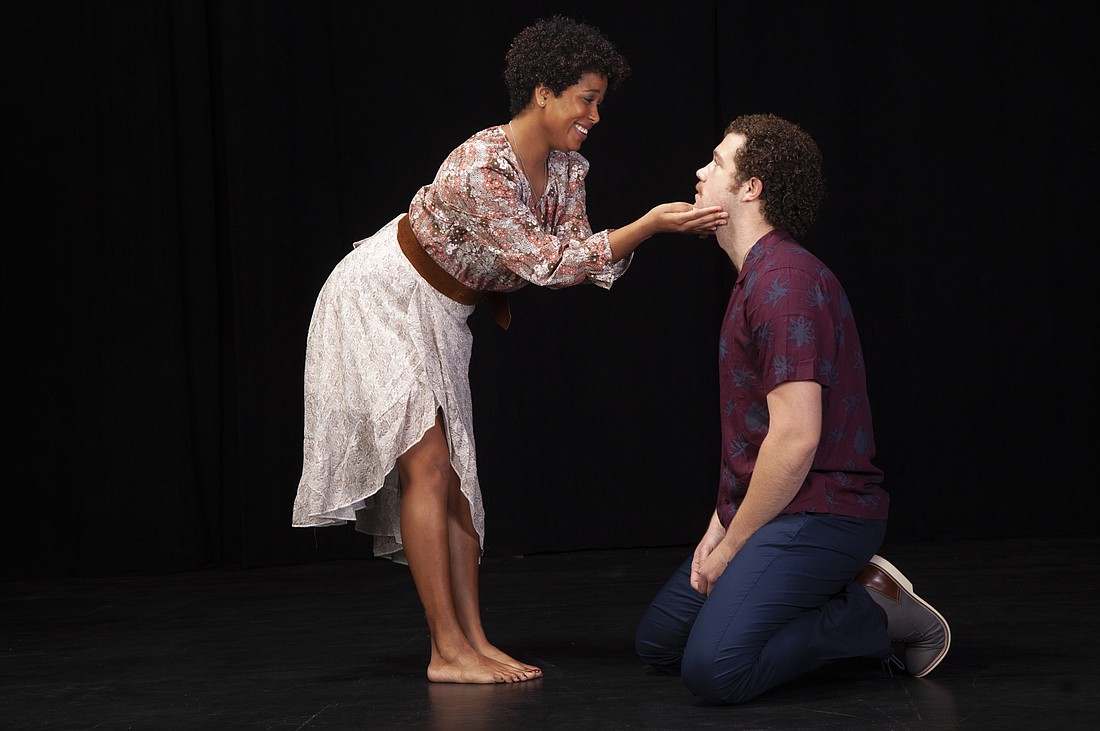- April 4, 2025
-
-
Loading

Loading

“Everybody” is now making his/her/their final exit in the Asolo Conservatory’s latest production. Let’s unpack what that means ….
The play’s title is the name of its hero. Branden Jacobs-Jenkins’ “Everybody” is a 21st century, postmodern upgrade of the 15th century play called “Everyman.” The medieval original was a morality play; this is more of a mortality play. “Everyman” was a Catholic plea for sinners to clean up their earthly acts before making an account to God after death. “Everybody” leaves God’s existence as an open question. (“It depends on your definition.”) Is there life after death? Who knows? Jacobs-Jenkins is more concerned with life before death.
“Death” appears (Jerald Wheat) and gets the play started. A reaper, but not that grim — he’s more like a grumbling, overworked middle manager. An ambiguously symbolic-or-real “God” (Macaria Martinez) gives “Death” his marching orders. The audience is snickering at the divine — make an example of somebody. “Death” obediently pulls a series of “Somebodies” from the audience. (Joe Ayers, Erin O’Connor, Christian Douglas, Evan Stevens and Dreaa Baudy.) Once the actors are all on stage, a bingo-like lottery determines who plays “Everybody.” Ayers wins. The other actors get to play everybody else. Imani Williams personifies “Time” — the ever-ticking clock. In this case, an exam clock.
In the original play’s eschatology, Everyman’s after-life begins with a test. It’s a lot like a graduate thesis. You stand before God and justify your life. Pass, and you go to heaven. Fail, and you go where the bad folks go.
“Everybody” faces a similar test. As “Death” puts it, “…. just like some general sense of your time here and how you spend it, how you lived your life so wrong and why — You know: like a report.” That report may unfold in the dying moments of consciousness. (The play stays on the fence about that.) But it’s a test all the same.
“Death” says it’s not all bad. “Everybody” can take somebody with them to the other side — if they’re willing to go. He begs various characters (all personifications of abstract concepts) to accompany him. “Stuff,” “Friendship,” “Kinship,” “Understanding,” and “Strength,” all say “no.” But “Love” (Sydney Story) goes with him to the end. “Evil” (Bryan Lewis) does too. That’s karma, folks.
This production is a dreamy experience. Falcian Page and Rebecca Rose Mims’ costumes alternate between the ordinary and the hallucinatory. Kudos also to Eliza Ladd’s otherworldly choreography. Her pieces draw you into the dreamtime. And speaking of altered states ….
Greg Leaming’s direction is snappy and surreal. The company of second-year student actors looks like they’re having a blast. (Dying on stage is fun, evidently.) The play has a few sad moments, but it’s mostly comedy. And a very different animal from the original.
Jacobs-Jenkins’ script leans into that difference with casual (sometimes jokey) contemporary speech. At times, the play feels like it’s spoofing the original — but it’s never quite “Bill and Ted’s Excellent Adventure.” Irreverent or not, it’s not always a laughing matter.
Heaven and Hell are high stakes, after all. If this earthly life is all there is (maybe) there’s far less gravitas. Though some remains …
When “God” and “Death” take the stage, it’s hard not take them seriously. They may appear in comedic form, but the reminder is there. That final exam is coming. And the clock is ticking.
You have been warned.